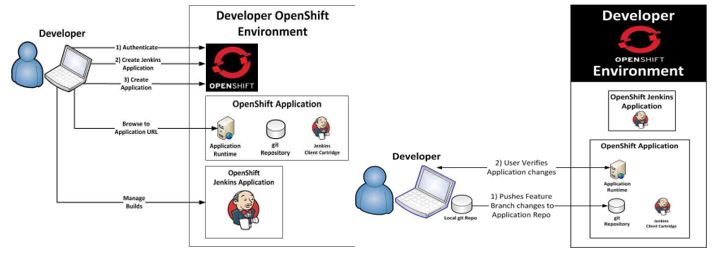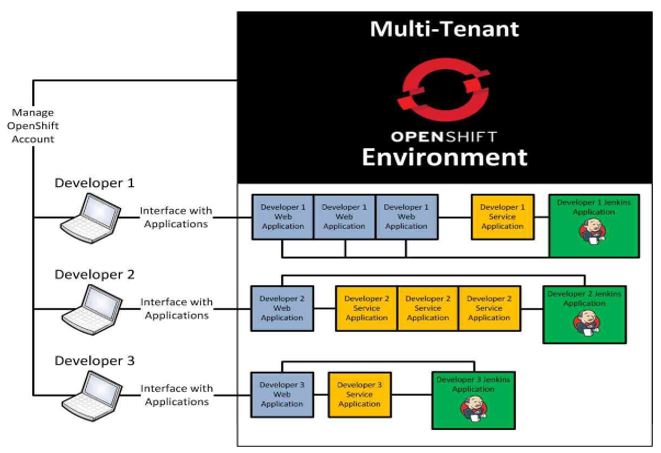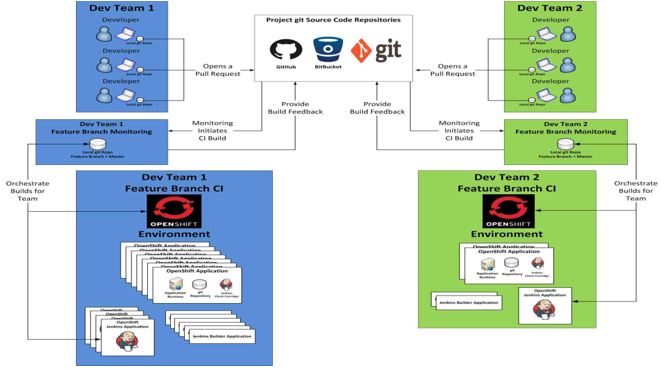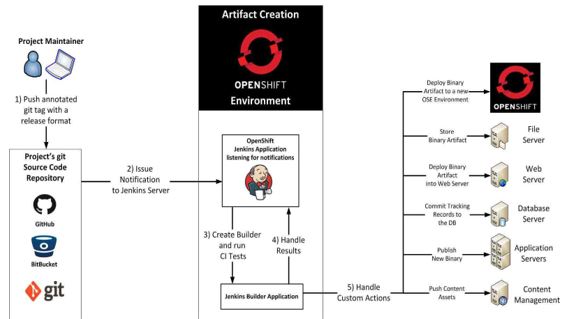How OpenShift useful for developer
Simplify the Development Experience
Developers focus on coding and verification using OpenShift for application hosting.
Reduce Resource Waste
Dynamic application hosting reduces the overall infrastructure footprint
Extensible Development Pattern
Reuse the same streamlined application development process facilitated by OpenShift across multiple development teams
Continuous Integration with Jenkins
Development teams can ensure that all code is tested in a consistent and workflow-friendly manner
Artifact Orchestration
After a new build is tested, Jenkins can zip the application and perform coordinated actions
“OpenShift simplifies the Development experience “
OpenShift Developer Experience

Simplify the Development Experience
Authenticate, manage applications, develop/fix, test, release.
Through openshift applicaiton we can
•Focus on increasing developer productivity • Decouple application dependencies
•No custom deployment solution • No co-mingled development teams
“OpenShift Reduces Resource Waste”
OpenShift Multi-Tenant Developer Environment

Reduce Resource Waste
- Developers can be co-located on OpenShift environments
- Developers can create, delete, and manage just their applications
- Delete unused applications to free up resources across the environment
- Limit developer provisioning capacity
- Adding more application hosting capacity without impacting current development
- Manage application hosting density
OpenShift Feature Branch Continuous Integration Workflow

• The Feature Branch Pattern can be extended to multiple development teams.
Including various: team sizes, layer, release cadence.
• The Master Branch Pattern can be extended to multiple development teams.
Including various: team sizes, layer, release cadence
• OpenShift is agnostic about the application type
• Streamline application development for handoff to QA
• Easy to customize
OpenShift Artifact Orchestration
Use Jenkins to perform coordinated actions for a new release
• Highly customizable
• Reduce new release publishing wait time
• Continuous Deployment
• Artifact orchestration is extensible to multiple development teams
• Create a single artifact that is deployment-ready for QA validation and production

OpenShift DevOps Use Cases
• Customizable OpenShift Data Centre Topologies
• Setup OpenShift across multiple Data Centres
• Hosting an Application in a Dedicated Resource Pool
• Support application scaling based on demand
• Out of the Box Application Deployment
• OpenShift supports artifact deployment management
• Application Monitoring
• Ensure OpenShift integrity across Data Centres
• Integration with Production Load Balancers
• Support existing Load Balancers for routing
We can reduce infrastructure costs by Hosting an Application in a Dedicated Resource Pool and thereafter monitoring pool utilization
• Simplify application management
• Production publishes only affect one application type
• Reduce production outage impacts by only hosting one application type per pool
• Scale the number of redundant instances up or down within a pool without impacting other production applications or services
Out of the Box Application Deployment
• Take the artifact handed off to QA and deploy it using the out of the box OpenShift REST API or command-line tool
• The OpenShift application deployment tools are agnostic to the type of application
• Deploy new releases in a standardized manner
• The OpenShift Application Deployment tools support a variety of status, activation, rollback, listing, and information functions
.
No comments:
Post a Comment